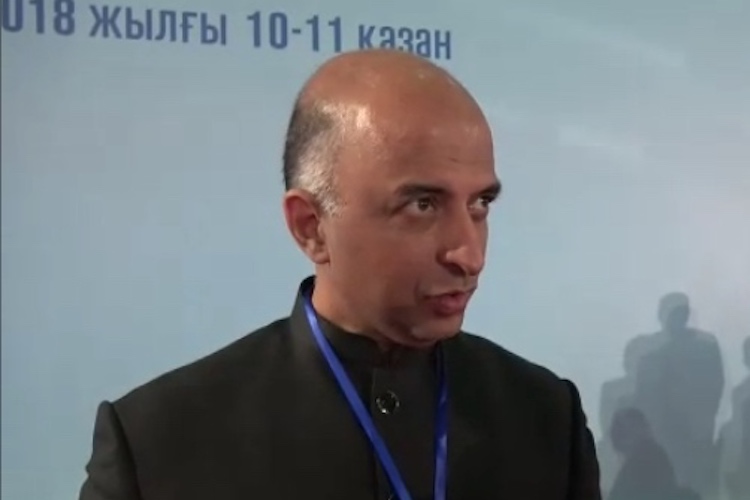Viewpoint by Samir Somaiya
The author is President of the Institute on the study of Indology and inter-religious dialogue ‘Somaiya Vidyavihar’. The following is the text of his remarks at the two-day Congress of the Leaders of World and Traditional Religions on October 10, 2018 in Astana, the capital of Kazakhstan, with the key topic ‘Religious Leaders for a Secure World’.
ASTANA (IDN-INPS) – The word secure, is derived from Latin, and means ‘se’ – without, and ‘cura’, care. Meaning ‘without care’. Without worry. Without fear. How do we help create a world where we all feel secure, free from fear and threats, and one in which we feel free to dream, hope and pursue our dreams.
The Sanskrit verse, taken from the sixth chapter of the Maha Upanishad, is engraved at the entrance hall of the Parliament of India, The verse says:
अयं निजः परो वेति गणना लघुचेतसाम् |उदारचरितानां तु वसुधैव कुटुम्बकम् || 6.71
“This is mine, that is yours, say the small minded. The entire world is a family, for the large hearted.” (6.71)
We all live in very diverse worlds. Our worlds can be divided into nations, religions, languages, ethnicities, genders, and as many differences we can think about. Our way of dress, the food we eat, the colour of our skin, the culture to which we belong, our way of worshipping God, etc., are all expressions of those differences. Do we celebrate this diversity? Or do we seek to want the world to look alike and exactly the same, and one that conforms to our world view?
These differences have often become an obstacle to our living together. They must instead be seen as enriching our human community and our lives. The verse quoted above makes us see the world as one without boundaries, and just as in a family we have different members with varied hopes, dreams, ages, and abilities, so also the entire world.
Mahatma Gandhi famously said: “The world has enough for everyone’s need, but not enough for everyone’s greed.” If one is to look at the world as one family, then one must care for the world. The Bhagavad Gita also says that
यज्ञशिष्टाशिनः सन्तो मुच्यन्ते सर्वकिल्बिषैः ।
भुञ्जते ते त्वघं पापा ये पचन्त्यात्मकारणात् ॥ 3.13॥
Meaning, that one who cooks for himself alone, is committing a sin. And only he who eats last after providing for all, is freed from sin. Here, the meaning is to pursue action, to pursue work, but to work for all, and to partake of the fruit of one’s work, only after making sure that all others have been provided for. After we have ‘secured’ for others, their well-being.
If people in the world looked out only for themselves, and did not bother or care for those around them, then you have the world that is ‘secure for me,’ but ‘there is no place for you’. Mahatma Gandhi was referring to this ‘greed’.
We must not become blind to other people’s needs, deaf to their cries of help, indifferent to their problems. We must always be alive to address the needs of our extended families, the needs of those living next door, the needs of those working with us, the needs of those who we perceive to be ‘other’ than us, i.e., a different country, a different religion, a different culture.
In the Atharvaveda, it has been said : Earn with a hundred hands and give with a thousand hands.
“शतहस्त समाहर सहस्रहस्त संकिर” | (Atharvaveda III.24.5).
Meaning that one must work, and one must earn. But one must earn to give. To provide a safer and more secure world.
And we must set examples in our own places of work and activity. We all exercise some degree of ‘soft power’, i.e., a power exercised through persuasion, instead of ‘hard power’ that is exercised through military force or economic sanctions. This can be demonstrated by example, or the environment we create in our spheres of influence.
If I represent an educational institution, we must welcome all. All people from all walks of life, demographics, religions, languages, cultures. We must celebrate diversity. We must also understand that we may have different value systems.
Do we provide a platform to be able to discuss different values? Can we agree to differ, can we agree to come together? Do we only tolerate one other, or do we truly respect each other.
Much violence is being perpetrated in the world in the name of religion, nationalities, languages, cultures, and other boundaries. A poet famously said:
कोई हिन्दू कोई मुस्लिम कोई ईसाई है
सब ने इंसान न बनने की क़सम खाई है
निदा फाज़ली
Meaning that we have all decided to be Hindus, Muslims and Christians over being people. We must be people first, and remember that in all conversations.
To see this unity, and to keep reminding us of this, we need dialogue. Dialogue is about listening to, understanding, and learning from each other in the knowledge that truth, and goodness are not exclusive to any religion in particular, but are spoken of in all religions.
In this Sixth Congress of the Leaders of World and Traditional Religions, at the invitation of the Honourable President, Mr. Nursultan Nazarbayev, we are provided the opportunity to come together, and discuss how we can, hand in hand, create a better, secure, peaceful and harmonious world. Let us keep trying. [IDN-InDepthNews – 12 October 2018]
Photo: Samir Somaiya. Credit: Katsuhiro Asagiri | IDN-INPS
IDN is the flagship agency of the International Press Syndicate
Facebook.com/IDN.GoingDeeper – twitter.com/InDepthNews

